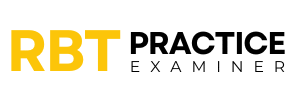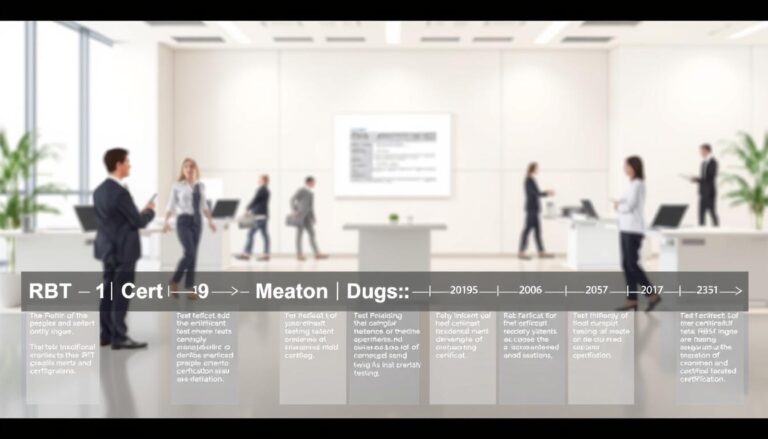High-Demand Jobs for Registered Behavior Technicians
The field of behavioral health is growing fast, opening up new career paths for Registered Behavior Technicians (RBTs). Those looking for RBT certification jobs have many options in different healthcare settings.
There’s a big need for skilled RBTs, mainly in autism support and behavioral programs. These jobs are great for those who want to make a real difference in healthcare and education.
Knowing what jobs you can get with an RBT certification can lead to many career choices. RBTs work in clinics and schools, helping people with developmental and behavioral issues.
Healthcare groups all over the country are looking for RBTs. They know how important these specialists are for patient care. The job market offers good pay, chances to grow professionally, and the chance to change lives with special behavioral strategies.
RBT certification is more than just a piece of paper. It’s a start to a fulfilling career where you help people learn important life skills and overcome challenges.
Understanding the Role of a Registered Behavior Technician
Registered Behavior Technicians (RBTs) are key in helping people with behavioral challenges, like those with autism. They work with Board Certified Behavior Analysts (BCBAs) to use special strategies to help.
RBTs have many roles in healthcare and schools. They need to know a lot about behavior analysis and how to work with clients.
Core Responsibilities and Daily Tasks
RBTs have many important tasks. They need to be precise and caring:
- Implementing behavior intervention plans
- Collecting and documenting client progress data
- Conducting one-on-one therapy sessions
- Developing supportive communication strategies
- Collaborating with treatment team members
Required Qualifications and Certifications
To be an RBT, you need certain education and skills:
| Requirement | Details |
|---|---|
| Minimum Education | High School Diploma or Equivalent |
| Age Requirement | 18 years or older |
| Training Hours | 40-hour behavior technician training |
| Certification Exam | Passed Psychometrics Exam |
Professional Standards and Ethics
RBTs must follow strict rules to protect their clients. Confidentiality, respect, and evidence-based practice are key.
They must keep learning and growing to stay certified and help others.
The Growing Demand for RBT Services in Healthcare
The healthcare world is seeing a big increase in the need for Registered Behavior Technicians (RBTs). This is because more people are realizing how important behavioral interventions are. They are key in treating developmental disorders, like autism spectrum conditions.
Several important factors are leading to more jobs for RBTs:
- Rising autism diagnosis rates nationwide
- Expanding awareness of behavioral health interventions
- Growing insurance coverage for specialized behavioral treatments
- Increased funding for developmental disability services
There are many places where RBTs can find work. Mental health clinics, pediatric centers, and rehabilitation facilities are all looking for them. They need people who can offer specialized behavioral support.
The U.S. Bureau of Labor Statistics says there will be a lot of growth in behavioral health jobs. This means there will be many career opportunities for RBTs in different healthcare settings.
Some areas where RBTs are in high demand include:
- Pediatric treatment centers
- Psychiatric hospitals
- School-based intervention programs
- Private clinical practices
- Telehealth behavioral support services
Professionals with RBT certification are becoming increasingly valuable in addressing complex behavioral health challenges.
What Jobs Can I Get with an RBT Certification
Registered Behavior Technicians (RBTs) find jobs in many places. They help people with behavioral challenges. This opens doors to careers that really make a difference.
Looking into RBT jobs shows many rewarding paths. These jobs are for those who love helping others through behavioral support.
Entry-Level Positions
New RBTs find many entry-level jobs. These jobs help them grow and learn. Some examples are:
- Behavioral therapy assistant in clinical settings
- School-based behavior support technician
- Autism intervention specialist
- Developmental disability support worker
Advanced Career Opportunities
With more experience, RBTs can move up. They can become:
- Behavior intervention specialist
- Program coordinator
- Clinical team leader
- Training and development coordinator
Specialization Options
RBTs can choose to specialize. This lets them focus on areas they love. Some options are:
- Pediatric behavioral intervention
- Geriatric behavioral support
- Autism spectrum disorder specialist
- Mental health behavioral technician
Each area offers a chance to become an expert. This helps people improve their lives and skills.
School-Based RBT Employment Opportunities
Registered behavior technicians (RBTs) are key in schools. They help students with behavioral and developmental challenges. Working with teachers, they make learning inclusive for all.
In the U.S., more schools see the importance of RBTs. They offer support in many educational places, like:
- Public elementary and secondary schools
- Special education programs
- Charter and private educational institutions
- Alternative learning centers
RBTs do important work in schools, such as:
- Implementing behavior intervention plans
- Helping students with social skills
- Supporting classroom management
- Working with teachers and special education staff
RBT jobs in schools need people who are flexible, patient, and good with different students. They must know a lot about behavior and how to make learning positive.
Those interested in RBT jobs in schools should be ready for a dynamic and challenging job. Their work helps students succeed and makes learning more inclusive.
Clinical Setting Career Paths for RBTs
Registered Behavior Technicians (RBTs) find many career paths in clinical settings. These jobs are rewarding and offer growth. They help people with behavioral challenges in different healthcare places.
Clinical settings offer RBTs exciting and fulfilling careers. They can work in many places, growing professionally and specializing in their field.
Private Practice Positions
Private practices give RBTs a chance to work with Board Certified Behavior Analysts (BCBAs). They do important tasks like:
- Implementing behavior intervention plans
- Collecting and documenting client progress
- Providing direct therapeutic support
- Collaborating with treatment teams
Healthcare Facility Roles
Healthcare facilities offer many jobs for RBTs. They can work in different areas, helping patients with different needs.
| Healthcare Setting | Primary Responsibilities |
|---|---|
| Hospitals | Behavioral intervention for pediatric and psychiatric patients |
| Outpatient Clinics | Individual and group therapy support |
| Mental Health Centers | Behavior modification and skill development |
Rehabilitation Center Opportunities
Rehabilitation centers provide RBTs with specialized environments. They help clients with various challenges, such as:
- Autism spectrum disorders
- Neurological conditions
- Traumatic brain injuries
- Developmental disabilities
In these centers, RBTs learn important skills. They assess patients, plan interventions, and provide full care.
Home-Based Services and Independent Contracting

Registered Behavior Technicians (RBTs) are finding great job opportunities in home-based services and independent contracting. This path offers flexibility and personal growth. It lets professionals work closely with clients and have more control over their work.
Home-based services have many benefits for RBTs:
- More flexibility in scheduling
- Direct, one-on-one client interactions
- Personalized support environments
- Potential for higher pay
Independent contractors need special skills to thrive. Effective communication, time management, and adaptability are key. These skills help professionals succeed outside traditional settings.
| Skill Category | Key Requirements | Professional Impact |
|---|---|---|
| Client Communication | Clear explanation of interventions | Enhanced trust and treatment outcomes |
| Documentation | Accurate progress tracking | Improved treatment strategies |
| Scheduling | Efficient time management | Maximized client service delivery |
Those thinking about home-based RBT work should think about their strengths and client skills. Successful contractors build strong networks, keep their credentials up, and stay current with skills.
Residential Treatment Facility Positions
Registered Behavior Technicians (RBTs) are key in residential treatment. They support people with special needs. Their work is all about making a big difference in people’s lives.
RBTs have many career paths in residential settings. They help create safe, supportive places for those needing help. Their skills are very important in these roles.
Group Home Employment
Working in group homes is a big opportunity for RBTs. They do many important things, like:
- Implementing behavior intervention plans
- Providing direct support to residents
- Documenting client progress
- Collaborating with interdisciplinary teams
Assisted Living Facility Roles
In assisted living, RBTs work with many people. They create plans to help each person. Their work improves lives and helps people stay independent.
| Residential Setting | Primary Responsibilities | Key Skills Required |
|---|---|---|
| Group Homes | Behavior management | Patience, communication |
| Assisted Living | Individual support plans | Adaptability, empathy |
RBT professionals in residential settings create meaningful connections, supporting clients’ development and independence through specialized behavioral techniques.
Remote and Telehealth RBT Opportunities

The world of RBT jobs has changed a lot with telehealth. Now, RBTs can work from anywhere, helping more people. This is a big change for those in behavioral intervention.
Telehealth lets RBTs work with clients far away. This is very helpful for those who can’t get to local health services.
- Virtual client assessment and intervention
- Remote behavior tracking and analysis
- Online training and skill development sessions
- Digital progress monitoring
The COVID-19 pandemic made telehealth even more important. Technology integration is now key for RBTs. It opens up many job opportunities.
| Telehealth RBT Skill Requirements | Technical Proficiencies |
|---|---|
| Strong digital communication | Video conferencing platforms |
| Adaptive intervention techniques | Data management software |
| Client engagement strategies | Remote assessment tools |
If you want to work in remote RBT jobs, learn about technology. Keep up with the latest in digital health. The future of helping people will be more flexible and tech-based.
Salary Expectations and Benefits in RBT Careers
Registered Behavior Technicians (RBTs) have many earning chances with their certification. They work in healthcare and education. Knowing the job prospects with RBT credentials helps in making career choices.
RBT salaries change based on experience, location, and work setting. They get good pay for their skills and dedication to helping those with behavioral issues.
Entry-Level Compensation
New RBTs start with good salaries. These salaries help them grow in their careers. The average salary for newbies is between $30,000 and $40,000 a year.
- Hourly rates start at $15-$20
- Part-time jobs offer flexible earnings
- Urban areas have higher starting wages
Advanced Position Salaries
More experienced RBTs with extra skills can earn more. They can make up to $50,000 or more a year in advanced or leadership roles.
| Experience Level | Typical Annual Salary | Potential Benefits |
|---|---|---|
| Entry-Level | $30,000 – $40,000 | Basic healthcare, training opportunities |
| Mid-Level | $40,000 – $50,000 | Advanced training, performance bonuses |
| Advanced/Specialized | $50,000 – $65,000 | Comprehensive benefits, leadership roles |
Regional Pay Variations
RBT salaries vary by region. Places with higher living costs and more need for behavioral health services pay more.
- California and New York: Highest average salaries
- Texas and Florida: Growing job markets with competitive wages
- Rural areas: Unique job chances with RBT credentials
Career Advancement Pathways for RBTs

Registered Behavior Technicians (RBTs) have many chances to grow in their careers. They work in applied behavior analysis. To move up, they need to plan well and keep learning.
There are several ways RBTs can advance:
- Pursue advanced certifications in specialized areas
- Develop expertise in specific behavioral intervention techniques
- Gain experience in diverse clinical settings
- Network with professional behavior analysis organizations
RBTs can also move into new roles like:
- Board Certified Behavior Analyst (BCBA) – A big step up
- Special education specialist
- Clinical supervisor
- Program development coordinator
Keeping up with education is key to more career chances. RBTs can improve their careers by:
- Attending professional workshops
- Participating in research projects
- Getting more specialized certifications
- Building leadership skills
Those who work on their skills can reach higher positions in behavioral health and education.
Emerging Job Markets for RBT Professionals
The world of RBT certification job titles is growing fast. It offers new chances for those in applied behavior analysis. With new tech and research, Registered Behavior Technicians can explore careers beyond usual clinics.
Those with an RBT certification will find a wide and changing job market. The field is growing fast in two main areas:
Technology Integration Roles
RBT experts are linking behavioral science with tech. They’re taking on new roles like:
- Behavioral Technology Consultants
- Digital Intervention Design Specialists
- Educational Technology Behavior Analysts
Research Opportunities
The research field is also opening up for RBT-certified pros. These jobs let them make big contributions to behavioral science:
| Research Role | Primary Responsibilities |
|---|---|
| Data Collection Specialist | Collecting and analyzing behavioral intervention data |
| Clinical Research Assistant | Supporting behavioral research studies and documentation |
| Intervention Protocol Developer | Creating and refining behavioral intervention strategies |
These new jobs show the dynamic power of RBT certification. Now, professionals can use their skills in tech, research, and clinics. This brings unmatched career flexibility.
Building a Successful RBT Career Portfolio
Creating a strong career portfolio is key for registered behavior technicians. It shows your skills, experiences, and what you can do in the field. Your portfolio is like a window into your professional world.
What should you include in your RBT career portfolio?
- Professional certifications and training documents
- Documented client success stories
- Performance evaluations and recommendations
- Data collection and intervention tracking samples
- Continuing education certificates
Making a great portfolio means showing off your achievements well. Emphasize what makes you special and show you’re dedicated to helping others.
| Portfolio Component | Importance | Recommended Content |
|---|---|---|
| Professional Certifications | Critical | RBT certification, specialized training certificates |
| Professional Experience | High | Detailed work history, client interaction summaries |
| Skills Demonstration | Essential | Data analysis, intervention strategies, communication skills |
How you present your portfolio is just as important as what’s in it. Make it clean and easy to share online. Use sites for professionals to show off your skills and achievements.
Your portfolio should always be up-to-date. Add new things like certifications and experiences to stay ahead in the job market.
Industry Trends Affecting RBT Employment
The job market for Registered Behavior Technicians is changing fast. New trends are opening up more career paths in different fields.
These trends are also changing how much RBTs can earn. Important changes are happening in the job market:
- More people need behavioral intervention services
- Telehealth and remote treatment are growing
- Behavioral health is getting more attention
- Technology is being used more in therapy
New tech is creating more job options for RBTs. Digital platforms are making it easier to work from home. Healthcare is using more digital tools that need special skills.
Changes in the population are also affecting RBT jobs. More kids are being diagnosed with autism, and mental health is getting more attention. This means there’s a big need for skilled RBTs.
More insurance coverage is also helping RBTs find jobs. Better mental health benefits are creating new job opportunities in schools and clinics.
- New research projects
- Special programs for interventions
- Working with other professionals
Those who keep up with these trends and improve their skills will have the best job opportunities. The job market for Registered Behavior Technicians is growing fast.
Conclusion
The world of work for RBT certified professionals is growing fast in healthcare and education. They can work in schools or clinics, helping people with behavioral issues. This shows a promising and rewarding career path.
Healthcare and schools see how important RBTs are for helping people. They can work in many places, like private clinics or online. This lets them choose where they want to work based on their interests and goals.
For those starting as RBTs, their certification is just the beginning. The field of behavioral health needs skilled and caring people. By always learning and following high standards, RBTs can grow in their careers and help others a lot.
Being an RBT is more than a job; it’s a chance to really help people. With hard work, training, and a love for helping others, RBTs can have careers that are both fulfilling and impactful.







